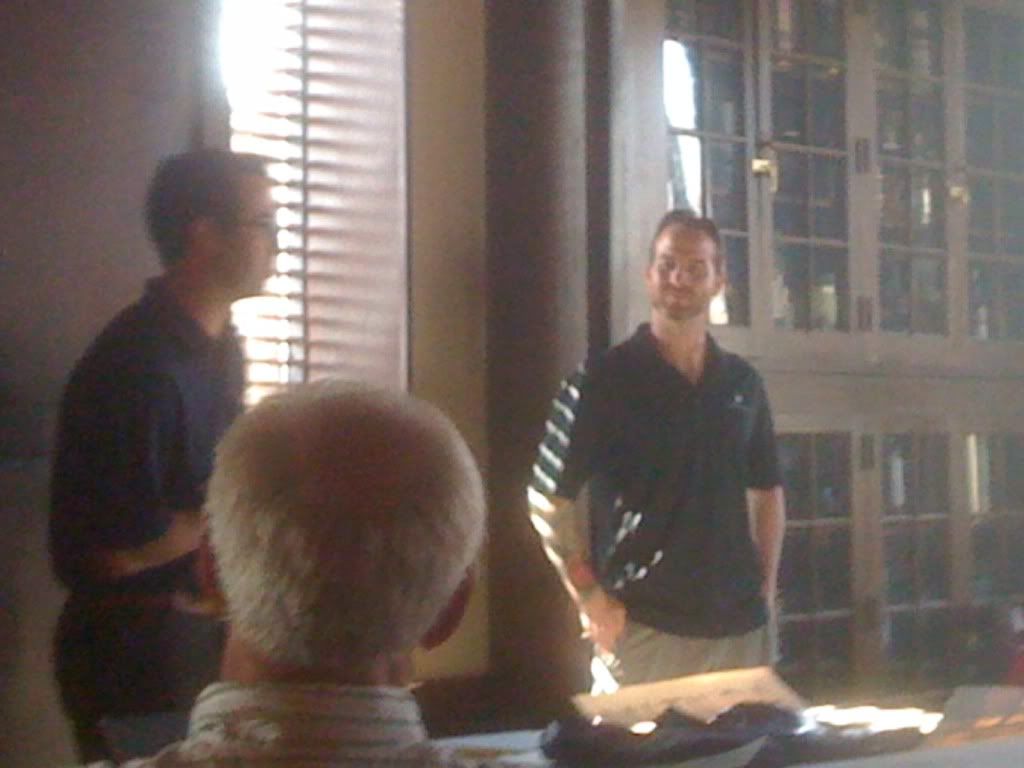Nice Honker's

Yes, that apostrophe in the post title is intentionally placed. Chicago’s Goose Island, probably best known for their Honker’s Ale, sent some of their local marketing/PR reps out to the Happy Gnome this past Wednesday for the latest installment of Beer School, a weekly event sponsored by the Happy Gnome and Ale Jail to let breweries “educate” potential customers on quality beer with free samples and even freer marketing messages.
Despite being the subject of an obvious PR ploy, I actually had a really good time and could see myself going to another Beer School event in the future (it could’t have been that bad if I’m bothering to write this post, right? Hey look: their clever plan to spread the word is working!!). Goose Island used the event to feature four of the five beers from their series of Belgian ales. This was right up my alley, as Belgians are sitting up there with Scotch ales as some of my favorite brew styles right now.

The beers we sampled were as follows:
- Sophie, their farmhouse ale / saison. Though a solid beer, it tasted quite refined for a saison. Most examples I’ve had in this style are a little more rough and cavalier with the palate, demanding more of your focus than being a team-player. Sophie played nice, but I can appreciate that too. Probably pairs with food much easier this way.
- Matilda, their Belgian pale ale. A portion of each batch is fermented in oak casks with brettanomyces (brett), a strain of wild yeast used to impart sour flavors to beers. This was decent beer (disclaimer: I’m not that interested in pale ales right now, even Belgian pales), but the sour notes didn’t really show up for me and were hardly worth mentioning. Seems like they’re just trying to appeal to beer nerds by using brett while simultaneously keeping the flavor as accessible as possible to appeal to a wide audience. I much preferred Dominique, the tweaked version of Matilda we tried later at the bar (not part of the free Beer School tasting).
- Dominique first came about in 2010 after some batches of Matilda had to be recalled after a lactobacillus infection that left them more sour than planned. The brewery did some work on the recalled beer and ended up making it a success story by re-releasing it as a new brand. It had an almost red wine-like tartness and acidity, yet with a familiar beer texture. I definitely paid $8.00 for a glass and wasn’t all that mad about it. Very good stuff.
- Pere Jacque, a dubbel abbey ale. Probably my favorite of the entire lot. I dug the carmel and dark fruit notes, as well as the versatility of this beer that can be effectively paired with anything from rich entrées to heavy chocolate deserts.
- Pepe Nero, the most interesting beer of the flight. It’s technically a saison base brewed with black peppercorns and probably some additional roasted malts to impart a rich dark color. This is like the Black IPA/IBA of saisons. Very unique.
The only beer in their Belgian line that didn’t make it to the party was Fleur, a Belgian style pale ale blended with hibiscus and kombucha tea. Their rep relayed that there were some problems in production that prevented this beer from making it to market on time. This shouldn’t come as a huge surprise, as Goose Island is known for their focus on consistency in their brews.
Of course, the big elephant in the room was that Goose Island was purchased by InBev / Anheuser-Busch about a month ago. This is a ballsy move by Goose Island, as InBev is generally viewed as satan by those in love with craft beer. They must really be looking to dig into InBev’s pockets and take an aggressive approach at changing America’s collective general beer palate.
The big concern is that InBev will come in and demand changes that affect the product negatively. Of course, their reps had anticipated this question and assured everyone that InBev bought Goose Island because they want to get in on the craft beer craze via a legitimate brewery (as opposed to their “secret” craft brands like ShockTop) and aren’t looking to change anything about the process, only to funnel money to their new investment for the sake of increasing output and market reach. Let’s hope this is done in as manageable and tasteful a manner as possible. I’d hate to see a brewery known for quality on the cusp of really flexing it’s creative talent to dumb it down or output crappy product in search of higher profit margins.

Pingback: 4th of July Weekend in Chicago – Part 2: Goose Island’s Clybourn Brew Pub « Barking Dog Beer